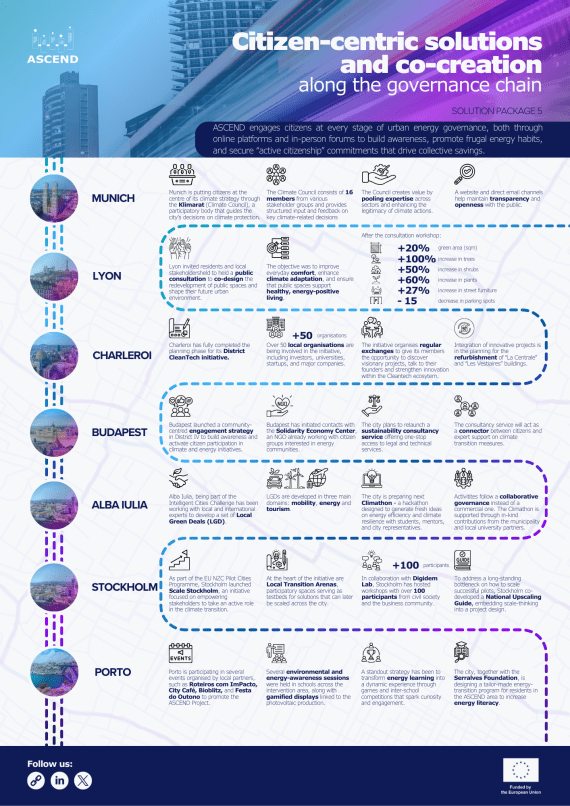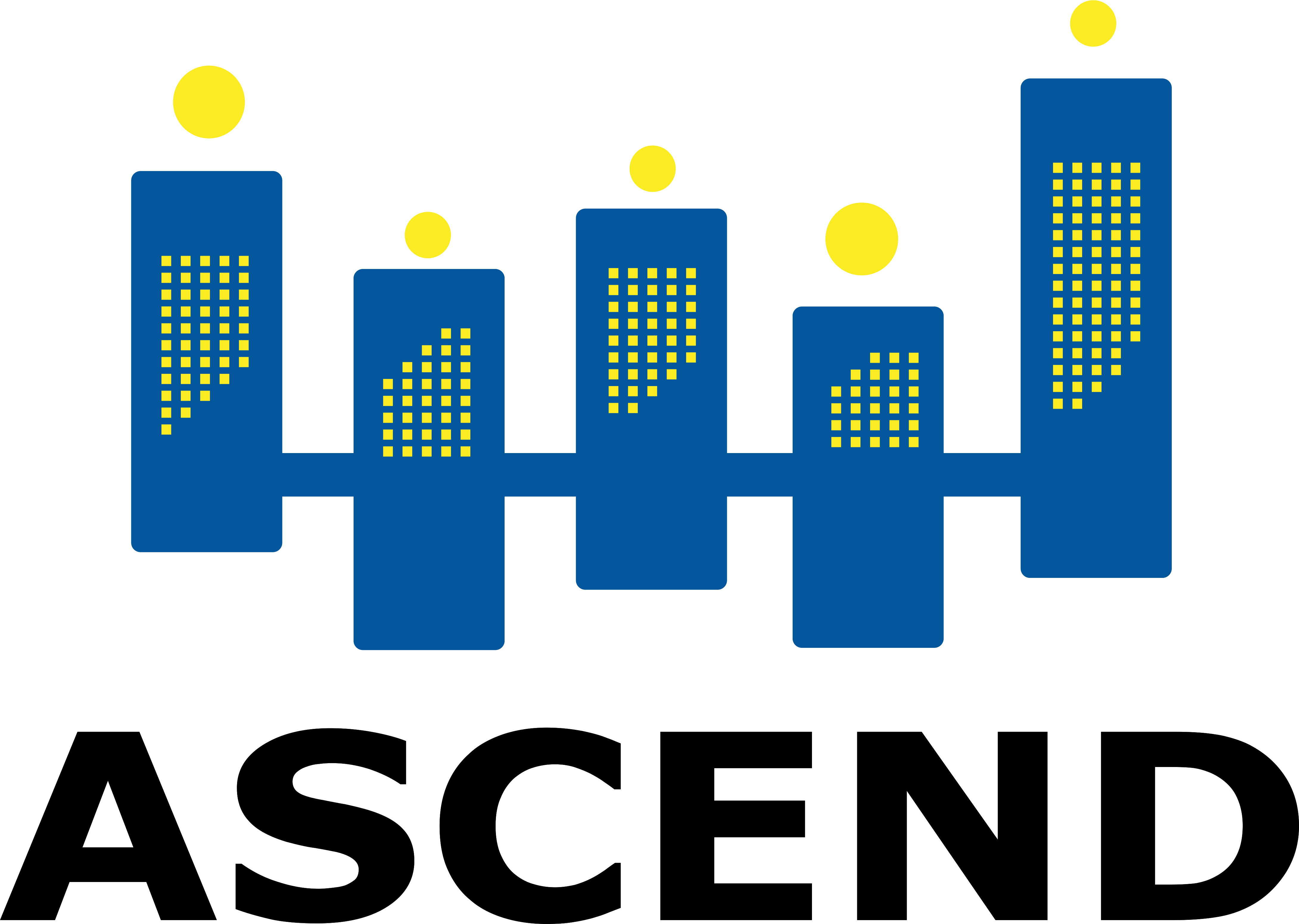
With Solution Package 5, ASCEND will focus on citizens to enable and stimulate their participation along the governance chain, both in online and offline spaces. Citizen participation will encourage increased awareness and frugal choices, leading to further energy savings.
- Online citizen participation
- Energy savings from increased awareness and frugal behaviour
- ‘Active citizenship’ and commitments

Citizen-centric solutions and co-creation along the governance chain
ASCEND engages citizens at every stage of urban energy governance, both through online platforms and in-person forums to build awareness, promote frugal energy habits, and secure “active citizenship” commitments that drive collective savings.
Alba Iulia is deepening its commitment to participatory climate action through two interlinked initiatives: the implementation of Local Green Deals (LGDs) under the Intelligent Cities Challenge (ICC) and the organisation of a youth-led Climathon. These actions aim to empower citizens, foster local partnerships, and support the co-creation of solutions aligned with the city’s PCED ambitions.
Key Developments in Alba Iulia’s SP5 Solutions
1. Local Green Deals via the Intelligent Cities Challenge
As part of its role as a Core City, and starting 2024 as an Advanced City, in the European Commission’s Intelligent Cities Challenge, Alba Iulia has been working with local and international experts to develop a set of LGDs in three strategic domains: energy, mobility, and tourism. These deals will guide future investments and collaborations, with a focus on the PCED area.
- All the six LGDs were submitted and approved by the program. Their implementation is ongoing.
- A team of three international experts, appointed by the ICC, has worked closely with the Lead expert and the city representatives through all the processes of defining the ideas and build the LGDs in order to be signed by relevant active stakeholders.
- The process has already resulted in new partnerships with SMEs and civil society organisations committed to local sustainability.
2. Climathon 2025
The city is preparing its second Climathon, a one-day hackathon-style event designed to generate fresh ideas on energy efficiency and climate resilience within the PCED. Co-organised with the „1 Decembrie 1918” University, the event will bring together students, mentors, and city representatives.
- Planning is 70% complete, with the event scheduled for Autumn 2025.
- Potential new locations include the university campus or a municipal building in a district affected by energy poverty.
- All participants will receive certificates of participation, and the city is exploring ways to integrate the best ideas into future community projects.
Business Model & Funding
The SP5 activities follow a collaborative governance model rather than a commercial one. LGDs rely on voluntary stakeholders participation and alignment with existing city strategies (e.g. SUMP, SEAP, Smart City Strategy). The Climathon is supported through in-kind contributions from the municipality and local university partners, ensuring a cost-efficient, community-focused event.
Challenges and Risks
- Stakeholder engagement: encouraging voluntary, long-term commitment from local actors requires ongoing dialogue and trust-building.
- Complex coordination: harmonising diverse priorities across sectors (energy, tourism, mobility) is resource-intensive.
- Event planning delays: the Climathon was postponed from 2024 to 2025 due to scheduling and location planning constraints.
Next Steps
- Continue the implementation of the solutions specified in the LGDs, starting Q4 of 2025.
- Launch calls for project proposals aligned with LGD objectives in 2025.
- Finalise the Climathon format and select the venue by Oct. 2025.
- Identify follow-up citizen engagement activities and introduce energy community concepts through the event.
Lessons Learned
- Direct, personal invitations and one-on-one meetings are more effective than mass outreach when engaging key local actors.
- Providing non-competitive recognition (e.g. certificates for all participants) ensures inclusivity and motivation in citizen events.
- Experienced mentors are essential to keeping students engaged and ensuring high-quality outputs during Climathon-style initiatives.
By combining long-term strategic planning with creative civic engagement, Alba Iulia is setting a strong example of how cities can co-create climate solutions with their communities and build lasting ownership for their PCED journey.
Budapest is strengthening its climate transition through two complementary SP5 solutions focused on citizen participation and local advisory services. By anchoring engagement at the district level and collaborating with grassroots organisations, the city is laying the foundation for inclusive, community-led climate action within its PCED.
Key Developments in Budapest’s SP5 Solutions
Community-Centred Participation and Dissemination Programme – Engaging Local Networks for Urban Transitions
Budapest is launching a community-centred engagement strategy in District IV to build awareness and activate citizen participation in climate and energy initiatives. The programme aims to support behaviour change, knowledge sharing, and local ownership of the transition.
- Initial engagement and mapping of potential participants have been completed in cooperation with the District IV municipality.
- The ASCEND project has been introduced during PCED stakeholder meetings and through collaboration with other EU projects.
- Budapest has initiated contacts with the Solidarity Economy Center, an NGO already working with citizen groups interested in energy communities.
- The programme is in the planning phase, with local workshops and co-production events scheduled for 2025.
District-Level Climate Consultancy – Restarting One-Stop Access to Sustainability Services
Budapest plans to relaunch a sustainability consultancy service offering technical and legal advice on energy renovation, PV installation, air quality, and climate adaptation.
- Previously active at the district level, the service was paused when its venue was repurposed for refugee support.
- A simplified scope is now under development to avoid overlap with other municipal services.
- The city is currently searching for a new venue, with plans to integrate the service into the main PCED building post-renovation.
- Once operational, it will act as a connector between citizens and expert support on climate transition measures.
Next Steps
- Host a local community engagement workshop in District IV.
- Launch stakeholder meetings focused on citizen-centric solutions.
- Secure a new space for the consultancy service and evaluate possible reopening.
- Expand collaboration with citizen organisations such as the Solidarity Economy Center.
Lessons Learned
- Targeted local engagement is essential to identify community champions and tailor messaging.
- Flexibility in design and delivery helps respond to changing local priorities, such as the need for refugee services.
- Partnerships with existing NGOs and schools may serve as amplifiers for city-led initiatives.
Budapest’s SP5 approach shows how municipalities can activate grassroots momentum through district-level strategies, knowledge-sharing platforms, and adaptable local services, ensuring no citizen is left behind in the energy transition.
Charleroi is shaping a new model for local climate action by bringing together academia, industry, investors, start-ups and public actors within the District CleanTech initiative. This SP5 solution aims to foster co-creation and knowledge exchange by building a collaborative cleantech campus that supports sustainable innovation at scale.
Key Developments in Charleroi’s SP5 Solution
District CleanTech – Building a Local Innovation Ecosystem
Charleroi has fully completed the planning phase for its District CleanTech initiative, which unites over 50 local organisations around shared goals of energy transition, circular economy, and sustainable construction.
- The initiative engages key actors including universities (UMons, ULiège, ULB,...), research centres (Cenaero, VKI, Sirris,…), start-ups, investors and major companies (John Cockerill, Industeel, Engie, AGC, Thales,..) to boost innovative solutions and support energy transition of industrial players.
- The initiative organises regular exchanges called ‘Meet the leaders of change’ to give its members the opportunity to (re)discover visionary projects, talk to their founders and strengthen innovation within the Cleantech ecosytem.
3rd Session on circularity precast concrete
- District CleanTech and Igretec are leading coordination and ecosystem development, while concrete projects are being identified and studied for their potential integration into the area’s broader regeneration plan (Porte Ouest).
- Integration of innovative projects in the planning for the refurbishment of “La Centrale” and “Les Vestiaires” buildings.
Next Steps
- Continue co-creation workshops with all stakeholders to update the roadmap and shape project priorities.
- Begin phased activation of the ecosystem in the “Vestiaire” building as renovations progress.
- Integration of innovative projects for the urban planning of the District CleanTech campus
- Continue coordination of the District CleanTech network, aligning new initiatives with shared goals.
Lessons Learned
- Ecosystem strength comes from diversity: Bringing together stakeholders across government, academia, business, and finance has created a dynamic foundation for innovation.
- Shared infrastructure and co-location encourage synergies and reduce duplication of efforts.
- The MIT REAP methodology has been a useful reference in designing the ecosystem’s structure and stakeholder engagement strategy.
Charleroi’s SP5 approach shows how cities can catalyse climate innovation by creating a common space for collaboration, where research, entrepreneurship, and public policy come together to accelerate sustainable urban transformation.
In Lyon, the transformation toward Positive Clean Energy Districts is not just about buildings and systems, it’s about people and place. Through targeted consultations, participatory design, and community feedback, the city is developing a model that embeds citizen voices into the climate transition. The focus: creating livable, resilient, and inclusive neighbourhoods.
Participatory meetings for existing public spaces refurbishment :
A recent highlight is the public consultation for the redevelopment of public spaces in the historic part of Lyon’s PCED. This process invited residents and local stakeholders to co-design the future of their urban environment. The objective: improve everyday comfort, enhance climate adaptation, and ensure that public spaces support healthy, energy-positive living.
To transform the existing public spaces in Confluence close to a school building, local residents were involved at several stages. A survey was carried out to find out how they felt in public spaces during heatwaves, and a survey was also carried out to ask inhabitants on their wills to improve their living environment (october 2024). This was followed by a consultation workshop (november 2024) and a final feedback session at the SPL Lyon Confluence office (march 2025). This overall process led to a big shift in the project towards a greener and healthier environment: during the consultation workshop, people asked to drastically reduce parking places nearby the school building, to develop a “kid-friendly” public space. It is a success that put one step further towards ASCEND goals.
Here are some key numbers :
After consultation workshop : +20% green area (m2) ; + 100% trees (the number of trees has been doubled) ; +50% of shrubs ; +60% of plants ; +27% of street furnitures ; +15 parking places deleted
Lessons Learned
- Engagement Drives Relevance: Climate solutions are stronger when shaped with and by the people they serve.
- From Participation to Ownership: Citizen input isn’t just consultation, it’s a gateway to shared responsibility for climate action.
- Design for Comfort and Resilience: Green public spaces are key to both physical comfort and behavioural change.
Through its participatory redesign of public spaces and its commitment to inclusive urban development, Lyon is placing citizens at the heart of the PCED transition. These efforts complement the city’s digital tools and technical innovations, proving that climate neutrality is not only about systems, but about shared vision and community trust.
As one of the ASCEND cities, Lyon continues to explore new ways to engage residents and stakeholders in shaping a cleaner, healthier urban future.
Munich is putting citizens at the centre of its climate strategy through the Klimarat (Climate Council), a participatory body that guides the city’s decisions on climate protection. Established in 2021, this low-cost yet high-impact initiative empowers experts and civil society representatives to shape policies, foster transparency, and support the city’s climate neutrality goals for 2035.
Key Developments in Munich’s SP5 Solution
Participatory Climate Governance – The Klimarat Advisory Body
The Climate Council consists of 16 members from various stakeholder groups: city administration, city council, civil society, business, and academia. The Council provides structured input and feedback on key climate-related decisions, supporting a more transparent and informed policy-making process.
- Advisory Function: Acts as a consultative body for climate-related decisions by the city administration and council.
- Public Access: Meetings are open to the public; citizens can attend as guest listeners by registering via email.
- Structured Governance: Operates under a defined statute and rules of procedure, with ~8 meetings per year and structured agenda sharing.
Business Model & Resources – Leveraging Civic and Social Capital
The Council creates value by pooling expertise across sectors and enhancing the legitimacy of climate actions. Its main resource is voluntary participation, representing an innovative form of civic engagement that requires minimal financial investment while delivering high returns in terms of trust and alignment.
Communication & Transparency – Digital Channels for Engagement
Communication tools such as a dedicated website and direct email channels help maintain transparency and openness, encouraging citizen interest and participation in the climate discourse.
Next Steps
- Continue public sessions and advisory contributions to upcoming city climate initiatives.
- Deepen partnerships with scientific institutions, NGOs, and business networks.
- Explore wider replication within Germany via national study participation.
Lessons Learned
- Civic Collaboration Works: A cross-sector advisory body can meaningfully influence policy while reinforcing public trust.
- Low-Cost, High-Value: Effective citizen-centric governance doesn’t always require large budgets, just the right partners and procedures.
- Replicable Model: The Climate Council concept can be applied in other cities, provided there is political will and stakeholder openness.
- Agility vs. Consensus: Balancing inclusive dialogue with timely decision-making remains a key challenge, especially during political transitions.
Munich’s Climate Council offers a compelling model for inclusive climate governance, one that blends institutional structure, public participation, and cross-sector collaboration to accelerate the journey to climate neutrality.
Stockholm is committed to becoming climate-positive by 2030 and fossil-fuel-free by 2040, surpassing Sweden's national target of climate neutrality by 2045. To accelerate this transition, the city is pioneering innovative approaches that place citizen engagement and behavioural change at the core of climate action.
1. Scale Stockholm: Climate & Health Transition Arenas
As part of the EU NetZeroCities Pilot Cities Programme, Stockholm launched Scale Stockholm, an initiative focused on empowering residents, associations, and local businesses to take an active role in the climate transition. The programme is anchored in four areas across the city:
- Inner City
- Stockholm Royal Seaport
- Järva
- Stockholm Green Innovation District (Årsta–Sickla)
These areas differ in population and development context, offering ideal conditions to test and adapt interventions.
At the heart of the initiative are Local Transition Arenas, participatory spaces co-created with residents, local organisations, city-owned companies, and district administrations. These arenas serve as testbeds for solutions that can later be scaled across the city.
In collaboration with Digidem Lab, a democracy lab supporting inclusive citizen dialogue, Stockholm has hosted workshops with over 100 participants from civil society and the business community. Together, they co-designed pilot projects focused on:
- Urban farming and local cultivation
- Energy efficiency in housing, schools, and businesses
- Circular economy measures to reduce plastic and waste
- Active mobility and biking infrastructure
- Temporary car-free zones and increased urban greenery
- Sustainable food systems and climate-smart consumption
- Data-informed planning for accessible and socially sustainable neighbourhoods
The next step is to test and further develop these projects, with successful ones scaled to additional parts of the city starting in 2026.
2. Strategic Integration: The National Upscaling Guide
To address a long-standing bottleneck on how to scale successful pilots, Stockholm co-developed a National Upscaling Guide. This tool embeds scale-thinking into project design from the outset and is currently being applied in programmes like Focus Skärholmen, with plans to expand into more urban districts.
Key features include:
- Guiding questions that bridge pilot innovation with the realities of public service delivery
- A dedicated section on citizen participation and behavioural change
- A framework to align project design with funding, governance, and institutional logic
- Support for cross-departmental alignment between innovation teams and city operations
3. Lessons Learned
- Design for Scale from the Start: Upscaling must be built into the pilot’s DNA.
- Bridge Administrative Cultures: Long-term success requires connecting innovation ecosystems with core city operations.
- Citizens as Catalysts: Public participation is vital for legitimacy and lasting impact.
- National Collaboration Matters: Working with academic and institutional partners strengthens scalability and replication.
Through Scale Stockholm and the Upscaling Guide, the city is developing a replicable model for embedding climate and health priorities into local governance and citizen co-creation. As one of the ASCEND cities, Stockholm’s experience offers valuable insights into how citizen-centric solutions can become the backbone of Positive Clean Energy Districts across Europe.
